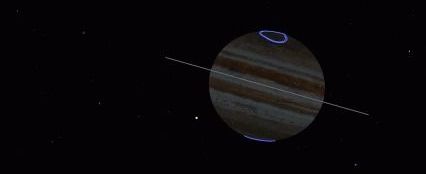NASA launched the Juno mission to Jupiter on August 5, 2011. After a five-year flight, the spacecraft entered orbit on July 4, 2016.
Jupiter is the largest planet in the Solar System, with an equatorial diameter of 142,984 kilometers. It is so large that it could contain all of the other planets within its volume. Since Jupiter rotates in a mere 9.925 hours, its equatorial diameter is more than 9275 kilometers greater than the distance between its poles.
There are radiation belts around Jupiter, similar to the Van Allen radiation belts that surround Earth, except they are thousands of times more powerful. Juno’s electronics are, therefore, enclosed within a titanium shell, so that the energetic particles trapped around Jupiter will not interfere with its systems.









Comments are closed.